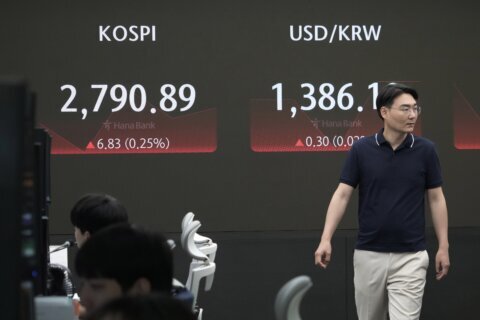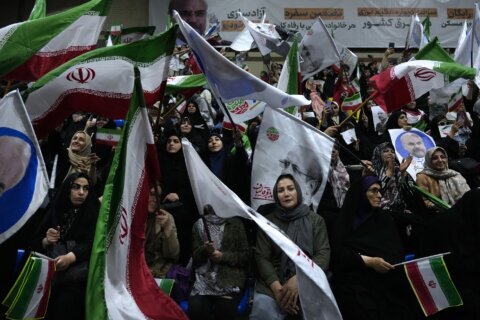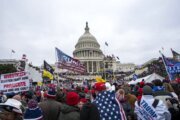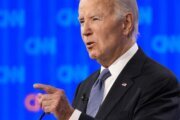DUBAI, United Arab Emirates (AP) — Iran’s supreme leader issued a thinly veiled warning Tuesday to the sole reformist candidate in the country’s upcoming presidential election, saying anyone who believes “all ways to progress” come from the United States shouldn’t be supported.
While often speaking in parables like many Iranian politicians, Supreme Leader Ayatollah Ali Khamenei appeared to directly undercut the candidacy of 69-year-old heart surgeon Masoud Pezeshkian, who has aligned himself with officials from the administration of former President Hassan Rouhani. Rouhani helped reach Iran’s 2015 nuclear deal with world powers, an accord Pezeshkian has fully embraced in contrast with his five hard-line opponents, who want an agreement fully on Iran’s terms.
Khamenei also called for “maximum” turnout for Friday’s vote, which analysts say could support Pezeshkian. Already, the doctor’s rallies have drawn large crowds in major cities, though it remains unclear whether his candidacy alone would be enough to push an apathetic public to vote to replace the late President Ebrahim Raisi, a protégé of Khamenei who died in a helicopter crash in May.
“Some politicians in our country believe they must kowtow to this power or that power, and it’s impossible to progress without sticking to famous countries and powers,” Khamenei said in a speech marking the Shiite holiday of Eid al-Ghadir. “Some think like that. Or they think that all ways to progress pass through America. No, such people can’t” run the country well, he said.
Khamenei’s comments in his hourlong speech drew repeated cries of “Death to America, death to Israel” from a raucous crowd. The 85-year-old Khamenei had to urge the crowd to quiet themselves several times during his remarks.
Khamenei’s call comes after a parliamentary election that saw a record low turnout earlier this year. Voters across the capital, Tehran, who have spoken with The Associated Press have expressed widespread apathy over the election as Iran faces an economy crushed by Western sanctions and after widespread anti-government protests in recent years, particularly after the 2022 death of Mahsa Amini and women refusing to wear the country’s mandatory headscarf, or hijab.
Pezeshkian, little known to the general public before registering for the campaign, has drawn large crowds in Tehran and other major cities. Among his most-prominent allies is former Foreign Minister Mohammad Javad Zarif, who led negotiations for the nuclear deal.
Khamenei’s remarks also can be seen as a warning to Zarif and even Rouhani himself, whose former administration has been blasted by hard-liners in the time since the collapse of the deal in 2018 after then-U.S. President Donald Trump unilaterally withdrew America from the deal. Since then, Iran has advanced its program to enrich uranium up to weapons-grade levels while also hampering the ability of international inspectors to monitor it.
Pezeshkian also has been trying to adopt symbols of previous campaigns by popular reformists, who seek to change Iran’s theocracy from inside. His campaign slogan “For Iran,” a call to nationalism rather than religion, mirrors an earlier campaign slogan used by former reformist President Mohammad Khatami.
Pezeshkian also has been photographed wearing green scarves — apparently trying to associate himself with the 2009 Green Movement protests that swept Iran after the disputed vote and bloody crackdown that saw hard-liner Mahmoud Ahmadinejad re-elected as president.
Khamenei made a point to seemingly link the upcoming election to the wider tensions in the Mideast amid the Israel-Hamas war.
“The Islamic Republic has enemies. One thing that helps the Islamic Republic overcome its enemies are the elections,” Khamenei said. “If a good turnout is seen in these elections, it will make the Islamic Republic proud.”
However, Friday’s vote comes after a record-low turnout in Iran’s March parliamentary election of just under 41%. Similar numbers could be seen in the presidential election as well.
If all the hard-line candidates stay in, they could split the vote against Pezeshkian and could force a second round of voting a week later as Iranian law requires a winner to receive more than 50% of all votes cast. Typically though, candidates drop out after the last debate and coalesce around one clear front runner.
“Pezeshkian is leading and over the next three days he will definitely widen the gap with others,” said analyst Abbas Abdi, who is aligned with reformists. “Withdrawing is not going to help them.”
Noting how all levers of Iran’s government had been held by hard-liners under Raisi without any change, Abdi added, “The ruling system has made a policy shift because it has realized that unifying the ruling system doesn’t work.”
Khamenei’s remarks appeared timed to give his opponents ammunition for the last televised debate before the election, which happened just a short time later. Pezeshkian did not directly acknowledge the supreme leader’s remarks, but stuck to his stance that talks to restore the deal remained key.
“Who should be blamed for these problems in the governmental offices and the inflation and prices of meat, bread and housing?” Pezeshkian said, before sarcastically answering: “America probably made these too!”
Hard-line candidate Amirhossein Ghazizadeh Hashemi repeatedly criticized Pezeshkian, particularly his ties to reformists. In one exchange, Ghazizadeh Hashemi sought to suggest Pezeshkian supporters could violently protest if he loses.
“Who started the troublemaking in the country? Who used to call people to the streets when they didn’t gain power?” he said. “I am worried that if Dr. Pezeshkian doesn’t win, his supporters, who have a notable history in this matter, will once again claim fraud and call people to the streets.”
Pezeshkian responded by mocking Ghazizadeh Hashemi for promising in the 2021 presidential campaign that he would solve all the problems in the country’s stock market in three days. The state TV feed of the debate showed Ghazizadeh Hashemi giving Pezeshkian a side-eye glance before cutting away.
“I’ve always taken the side of the oppressed and never taken the side of the oppressor,” Pezeshkian later said.
___
Associated Press journalists Amir Vahdat, Nasser Karimi and Mehdi Fattahi in Tehran, Iran, contributed to this report.
Copyright © 2024 The Associated Press. All rights reserved. This material may not be published, broadcast, written or redistributed.







